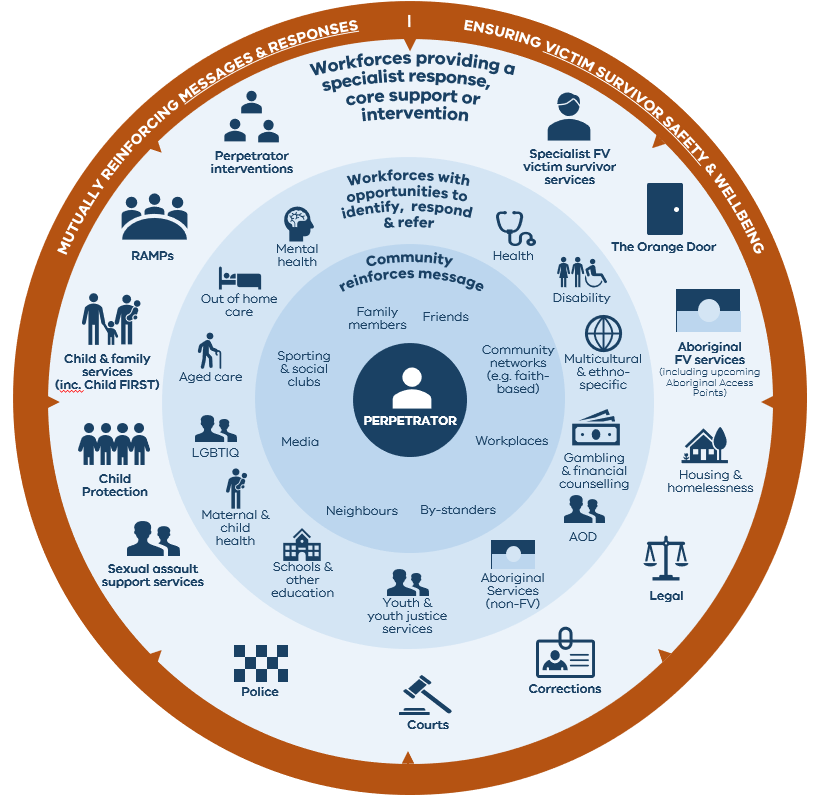What immediate supports does The Orange Door network provide?
The Orange Door network:
- assesses risk and needs
- assesses child and young person wellbeing
- responds to risk (including through safety planning)
- responds to crisis and immediate needs
- provides brokerage where needed
- supports people to get the help they need by connecting them to relevant services for ongoing support.
As part of crisis intervention, the Orange Door network can provide brokerage funds to individuals and families in order to meet immediate needs and reduce risk.
In 2022-23, The Orange Door network provided almost 29,000 crisis responses and short-term interventions, and over 48,000 connections to services. In addition to this, over 17,000 instances of brokerage support were provided.[1]
A breakdown of brokerage supports shows that the majority (74.6%) were devoted to victim survivors of family violence, with the remainder 13.6% supporting clients presenting with child or young person safety and wellbeing needs (referred to as affected adults or children). (Figure 11).[2]
Brokerage is often utilised as it can be activated quickly and is flexible enough for the cost to meet the identified need. Accordingly, brokerage is critical to the provision of direct support to clients of The Orange Door network. These processes have been strengthened with the development of the Family Violence Crisis Response model, which improves the way the service system works together to support victim survivors in a crisis.
How is The Orange Door network working to connect people to services?
One of the key functions of The Orange Door network is to connect individuals and families to the services they need. The process of connecting an individual or family to a service is done either by ‘allocation’ to a core service (for example, when a client is provided with a family violence service, child and family service, perpetrator service or a service from an ACCO) or by a ‘referral’ to broader services when a client is supported to access any other service outside of the core services (for example, services such as housing or mental health support) (Figure 12).
In 2022-23, The Orange Door network allocated clients to a core service response over 37,000 times and connected people to broader services almost 11,000 times; a total of over 48,000 allocations and connections - more than double the number in 2021-22 (Figure 13). The increase is partly due to initiatives across certain Orange Door areas to improve the recording of allocations in the CRM.
Perpetrator accountability and the role of The Orange Door network
In 2022-23, almost 51,000 cases were recorded with a client role of ‘perpetrator’, representing 20% of all cases across The Orange Door network. The family violence service system is progressively increasing its focus on perpetrator accountability and responses to adults using family violence are expanding. New initiatives have been introduced, including accommodation-based support for persons using family violence which aims to keep victim-survivors safe in their own homes.
The Victorian Government’s Family Violence Rolling Action Plan 2020-23 includes a priority focus on adults using family violence and articulates a whole-of-Victorian Government work program to strengthen perpetrator accountability.[3] This work is led by and builds on the vision of a strong ‘web of accountability’ articulated by the Royal Commission into Family Violence and the Expert Advisory Committee on Perpetrator Interventions (Figure 14). The web includes the people, groups, services, and systems that must work together to form a cohesive system to engage with and influence an adult using family violence’s behaviour to achieve perpetrator accountability.
The Orange Door network, enabled by CIP, MARAM and FVISS/CISS, plays a critical role in assessing and responding to adults using family violence. In February 2022, the Adult Using Family Violence-focused Comprehensive MARAM Practice Guides and tools were released.
In addition, the Adult Using Family Violence comprehensive risk assessment tool was released on the online platform Tools for Risk Assessment and Management (TRAM) in July 2023 (which is beyond the period of this report).
In collaboration with Practice Leadership, FSV has developed statewide operational guidance for The Orange Door response to adults using family violence. The focus is on the role of The Orange Door in engaging with adults using family violence, as well as assessing and managing the risk they pose. Across the network, each site is developing local implementation plans to support the change management approach for MARAM alignment to the comprehensive tools.
MARAM Comprehensive Adult Using Family Violence training has been tailored for the Orange Door to include the statewide guidance alongside the MARAM Adult Using Family Violence Practice Guidance. MARAM Comprehensive Adult Using Family Violence training is scheduled to begin delivery in the next financial year.
Notes
[1] Note this figure should not be compared to previous years due to different counting methodology.
[2] Note that needs identified with small proportions such as Physical health and wellbeing, Support for connection, Education and Employment, Care/placement of pets, Disability, Legal and court support, Alcohol and Drugs have been grouped into ‘other.'
[3] Family Violence Reform Rolling Action Plan 2020-2023 webpage, State Government of Victoria, accessed 14 October 2022.
Updated



